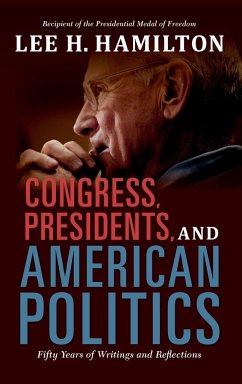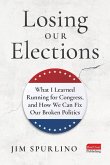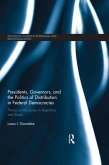- Gebundenes Buch
- Merkliste
- Auf die Merkliste
- Bewerten Bewerten
- Teilen
- Produkt teilen
- Produkterinnerung
- Produkterinnerung
Lee Hamilton is a Distinguished Scholar at¿Indiana University. He was a member of the US House of Representatives for 34 years¿and¿Vice Chair of the 9/11 Commission. In¿2015, Hamilton was awarded the Presidential Medal of Freedom.¿He is author of many books, including¿How Congress Works and Why You Should Care¿(IUP, 2004) and¿Strengthening Congress¿(IUP, 2009).
Andere Kunden interessierten sich auch für
![Presidents, Pandemics, and Politics Presidents, Pandemics, and Politics]() Max J. SkidmorePresidents, Pandemics, and Politics41,99 €
Max J. SkidmorePresidents, Pandemics, and Politics41,99 €![Life of Abraham Lincoln: His Early History, Political Career, Speeches in and Out of Congress, Together With Many Characteristic Stories and Ya Life of Abraham Lincoln: His Early History, Political Career, Speeches in and Out of Congress, Together With Many Characteristic Stories and Ya]() Joseph Hartwell BarrettLife of Abraham Lincoln: His Early History, Political Career, Speeches in and Out of Congress, Together With Many Characteristic Stories and Ya51,99 €
Joseph Hartwell BarrettLife of Abraham Lincoln: His Early History, Political Career, Speeches in and Out of Congress, Together With Many Characteristic Stories and Ya51,99 €![Presidents, Monarchs, and Prime Ministers Presidents, Monarchs, and Prime Ministers]() Carsten AnckarPresidents, Monarchs, and Prime Ministers88,99 €
Carsten AnckarPresidents, Monarchs, and Prime Ministers88,99 €![Losing Our Elections: What I Learned Running for Congress, and How We Can Fix Our Broken Politics Losing Our Elections: What I Learned Running for Congress, and How We Can Fix Our Broken Politics]() Jim SpurlinoLosing Our Elections: What I Learned Running for Congress, and How We Can Fix Our Broken Politics27,99 €
Jim SpurlinoLosing Our Elections: What I Learned Running for Congress, and How We Can Fix Our Broken Politics27,99 €![Presidents, Governors, and the Politics of Distribution in Federal Democracies Presidents, Governors, and the Politics of Distribution in Federal Democracies]() Lucas I GonzálezPresidents, Governors, and the Politics of Distribution in Federal Democracies146,99 €
Lucas I GonzálezPresidents, Governors, and the Politics of Distribution in Federal Democracies146,99 €![Congress, Progressive Reform, and the New American State Congress, Progressive Reform, and the New American State]() Robert HarrisonCongress, Progressive Reform, and the New American State117,99 €
Robert HarrisonCongress, Progressive Reform, and the New American State117,99 €![Presidents, Monarchs, and Prime Ministers Presidents, Monarchs, and Prime Ministers]() Carsten AnckarPresidents, Monarchs, and Prime Ministers88,99 €
Carsten AnckarPresidents, Monarchs, and Prime Ministers88,99 €-
-
-
Lee Hamilton is a Distinguished Scholar at¿Indiana University. He was a member of the US House of Representatives for 34 years¿and¿Vice Chair of the 9/11 Commission. In¿2015, Hamilton was awarded the Presidential Medal of Freedom.¿He is author of many books, including¿How Congress Works and Why You Should Care¿(IUP, 2004) and¿Strengthening Congress¿(IUP, 2009).
Hinweis: Dieser Artikel kann nur an eine deutsche Lieferadresse ausgeliefert werden.
Hinweis: Dieser Artikel kann nur an eine deutsche Lieferadresse ausgeliefert werden.
Produktdetails
- Produktdetails
- Verlag: Indiana University Press (IPS)
- Seitenzahl: 382
- Erscheinungstermin: 1. April 2016
- Englisch
- Abmessung: 235mm x 157mm x 27mm
- Gewicht: 769g
- ISBN-13: 9780253020864
- ISBN-10: 0253020867
- Artikelnr.: 43707902
- Herstellerkennzeichnung
- Books on Demand GmbH
- In de Tarpen 42
- 22848 Norderstedt
- info@bod.de
- 040 53433511
- Verlag: Indiana University Press (IPS)
- Seitenzahl: 382
- Erscheinungstermin: 1. April 2016
- Englisch
- Abmessung: 235mm x 157mm x 27mm
- Gewicht: 769g
- ISBN-13: 9780253020864
- ISBN-10: 0253020867
- Artikelnr.: 43707902
- Herstellerkennzeichnung
- Books on Demand GmbH
- In de Tarpen 42
- 22848 Norderstedt
- info@bod.de
- 040 53433511
Lee H. Hamilton
Introduction
1. The Johnson Years (1965-1968): A Remarkable Time to Begin in Congress
Passing Medicare
The Other War in Vietnam
Thanksgiving 1966
Luncheon at the White House
Visit to the CIA
President Johnson Off the Record
Urban Riots
The Regular Order
The U.S. Role in the World
Senate Hearings on the Vietnam War
Civil Disorder after Assassination of Martin Luther King Jr.
The Assassination of Robert Kennedy
2. The Nixon Years (1969-1974): Accomplishments Amid Turmoil
Christmas at the Nixon White House
Changing the House Seniority System
Meeting with Student Protesters
Reducing the Voting Age
Setting up our System of Government
Reports on Trip to War Zone
The Pentagon Papers
Nixon's Trip to China
Evaluation of the Apollo Program
Inauguration 1973
The Costs of the Vietnam War
The Vice President's Resignation
The House Judiciary Committee and Impeachment
After Watergate
3. The Ford Years (1974-1976): A Needed Respite
The Pardon
As We Leave Vietnam
The Middle Class
The Women's Rights Movement
Politicians
Democracy and Capitalism
Big Government
Congress and Foreign Policy
4. The Carter Years (1977-1980): Intra-party Discord
Inauguration Day 1977
Human Rights
Reorganizing the Federal Bureaucracy
The Panama Canal Treaty
An Assessment of the Carter Administration
The Congressional Budget Process
A Good Word For America
The Gasoline Shortage
The Iranian Hostage Crisis
Deregulation
5. The Reagan Years (1981-1988): Letting the Democratic Process Work
President Reagan Looks at Social Security
Improving Intelligence Analysis
The Week the Government Stopped
Reflections on the 97th Congress
The Military Balance
Religion in Politics
How a Member Decides
The Appeal of Congress
Our Constitutional Heritage
Issues of the Future
Covert Actions in a Democratic Society
The Reagan-Gorbachev Summit
The Budget Legacy of the Reagan Years
The Quiet Crisis
6. The George H. W. Bush Years (1989-1992): A New World Order
SDI reassessment
House Ethics Reform
Supply-side Economics
National Spending Priorities
Lessons of the Great Society
The United States Flag and the Constitution
The Balanced Budget Amendment
The President's Arms Control Speech
Congressional Perks
The Confirmation Process
Iraq and the Persian Gulf War One Year Later
7. The Clinton Years (1993-2000): Opportunity Lost
Questions About Congress
Reinventing Government
Public Cynicism
The Term Limit Movement and Congressional Change
The Contract with America
A Sensible Role for Government
The Budget Battle
Civility in Congress
The Budget Surplus
The Starr Report and the Congressional Response
The Work of Congress
The Record of the 105th Congress
Why Voting Matters
8. The George W. Bush Years (2001-2008): A Timid Congress
Why the President Needs the Help of Congress to Make Foreign Policy
The Merits of Citizen Engagement
Why Congress Needs to Assert Itself
Oversight At Last
We Urgently Need Redistricting Reform
Our Leaders Must Find a Balance on Iraq
What Politics Should Be About
The Ten Commandments of Citizenship
9. The Obama Years (2009-2014): Continuing Struggles
Is Congress Up To The Task Before It?
Polarization Will Not Disappear Quickly
Here's An Idea For Congress: Try Democracy
In Congress, Going Big Isn't Always the Answer
It's Not Just Congress: Citizens Also Have Room to Improve
The Invisible Lawmakers
The Justices and the Scramble for Cash
Now It's Time to Focus on the Economy
The Summer of Our Discontent
10. Some Concluding Thoughts
1. The Johnson Years (1965-1968): A Remarkable Time to Begin in Congress
Passing Medicare
The Other War in Vietnam
Thanksgiving 1966
Luncheon at the White House
Visit to the CIA
President Johnson Off the Record
Urban Riots
The Regular Order
The U.S. Role in the World
Senate Hearings on the Vietnam War
Civil Disorder after Assassination of Martin Luther King Jr.
The Assassination of Robert Kennedy
2. The Nixon Years (1969-1974): Accomplishments Amid Turmoil
Christmas at the Nixon White House
Changing the House Seniority System
Meeting with Student Protesters
Reducing the Voting Age
Setting up our System of Government
Reports on Trip to War Zone
The Pentagon Papers
Nixon's Trip to China
Evaluation of the Apollo Program
Inauguration 1973
The Costs of the Vietnam War
The Vice President's Resignation
The House Judiciary Committee and Impeachment
After Watergate
3. The Ford Years (1974-1976): A Needed Respite
The Pardon
As We Leave Vietnam
The Middle Class
The Women's Rights Movement
Politicians
Democracy and Capitalism
Big Government
Congress and Foreign Policy
4. The Carter Years (1977-1980): Intra-party Discord
Inauguration Day 1977
Human Rights
Reorganizing the Federal Bureaucracy
The Panama Canal Treaty
An Assessment of the Carter Administration
The Congressional Budget Process
A Good Word For America
The Gasoline Shortage
The Iranian Hostage Crisis
Deregulation
5. The Reagan Years (1981-1988): Letting the Democratic Process Work
President Reagan Looks at Social Security
Improving Intelligence Analysis
The Week the Government Stopped
Reflections on the 97th Congress
The Military Balance
Religion in Politics
How a Member Decides
The Appeal of Congress
Our Constitutional Heritage
Issues of the Future
Covert Actions in a Democratic Society
The Reagan-Gorbachev Summit
The Budget Legacy of the Reagan Years
The Quiet Crisis
6. The George H. W. Bush Years (1989-1992): A New World Order
SDI reassessment
House Ethics Reform
Supply-side Economics
National Spending Priorities
Lessons of the Great Society
The United States Flag and the Constitution
The Balanced Budget Amendment
The President's Arms Control Speech
Congressional Perks
The Confirmation Process
Iraq and the Persian Gulf War One Year Later
7. The Clinton Years (1993-2000): Opportunity Lost
Questions About Congress
Reinventing Government
Public Cynicism
The Term Limit Movement and Congressional Change
The Contract with America
A Sensible Role for Government
The Budget Battle
Civility in Congress
The Budget Surplus
The Starr Report and the Congressional Response
The Work of Congress
The Record of the 105th Congress
Why Voting Matters
8. The George W. Bush Years (2001-2008): A Timid Congress
Why the President Needs the Help of Congress to Make Foreign Policy
The Merits of Citizen Engagement
Why Congress Needs to Assert Itself
Oversight At Last
We Urgently Need Redistricting Reform
Our Leaders Must Find a Balance on Iraq
What Politics Should Be About
The Ten Commandments of Citizenship
9. The Obama Years (2009-2014): Continuing Struggles
Is Congress Up To The Task Before It?
Polarization Will Not Disappear Quickly
Here's An Idea For Congress: Try Democracy
In Congress, Going Big Isn't Always the Answer
It's Not Just Congress: Citizens Also Have Room to Improve
The Invisible Lawmakers
The Justices and the Scramble for Cash
Now It's Time to Focus on the Economy
The Summer of Our Discontent
10. Some Concluding Thoughts
Introduction
1. The Johnson Years (1965-1968): A Remarkable Time to Begin in Congress
Passing Medicare
The Other War in Vietnam
Thanksgiving 1966
Luncheon at the White House
Visit to the CIA
President Johnson Off the Record
Urban Riots
The Regular Order
The U.S. Role in the World
Senate Hearings on the Vietnam War
Civil Disorder after Assassination of Martin Luther King Jr.
The Assassination of Robert Kennedy
2. The Nixon Years (1969-1974): Accomplishments Amid Turmoil
Christmas at the Nixon White House
Changing the House Seniority System
Meeting with Student Protesters
Reducing the Voting Age
Setting up our System of Government
Reports on Trip to War Zone
The Pentagon Papers
Nixon's Trip to China
Evaluation of the Apollo Program
Inauguration 1973
The Costs of the Vietnam War
The Vice President's Resignation
The House Judiciary Committee and Impeachment
After Watergate
3. The Ford Years (1974-1976): A Needed Respite
The Pardon
As We Leave Vietnam
The Middle Class
The Women's Rights Movement
Politicians
Democracy and Capitalism
Big Government
Congress and Foreign Policy
4. The Carter Years (1977-1980): Intra-party Discord
Inauguration Day 1977
Human Rights
Reorganizing the Federal Bureaucracy
The Panama Canal Treaty
An Assessment of the Carter Administration
The Congressional Budget Process
A Good Word For America
The Gasoline Shortage
The Iranian Hostage Crisis
Deregulation
5. The Reagan Years (1981-1988): Letting the Democratic Process Work
President Reagan Looks at Social Security
Improving Intelligence Analysis
The Week the Government Stopped
Reflections on the 97th Congress
The Military Balance
Religion in Politics
How a Member Decides
The Appeal of Congress
Our Constitutional Heritage
Issues of the Future
Covert Actions in a Democratic Society
The Reagan-Gorbachev Summit
The Budget Legacy of the Reagan Years
The Quiet Crisis
6. The George H. W. Bush Years (1989-1992): A New World Order
SDI reassessment
House Ethics Reform
Supply-side Economics
National Spending Priorities
Lessons of the Great Society
The United States Flag and the Constitution
The Balanced Budget Amendment
The President's Arms Control Speech
Congressional Perks
The Confirmation Process
Iraq and the Persian Gulf War One Year Later
7. The Clinton Years (1993-2000): Opportunity Lost
Questions About Congress
Reinventing Government
Public Cynicism
The Term Limit Movement and Congressional Change
The Contract with America
A Sensible Role for Government
The Budget Battle
Civility in Congress
The Budget Surplus
The Starr Report and the Congressional Response
The Work of Congress
The Record of the 105th Congress
Why Voting Matters
8. The George W. Bush Years (2001-2008): A Timid Congress
Why the President Needs the Help of Congress to Make Foreign Policy
The Merits of Citizen Engagement
Why Congress Needs to Assert Itself
Oversight At Last
We Urgently Need Redistricting Reform
Our Leaders Must Find a Balance on Iraq
What Politics Should Be About
The Ten Commandments of Citizenship
9. The Obama Years (2009-2014): Continuing Struggles
Is Congress Up To The Task Before It?
Polarization Will Not Disappear Quickly
Here's An Idea For Congress: Try Democracy
In Congress, Going Big Isn't Always the Answer
It's Not Just Congress: Citizens Also Have Room to Improve
The Invisible Lawmakers
The Justices and the Scramble for Cash
Now It's Time to Focus on the Economy
The Summer of Our Discontent
10. Some Concluding Thoughts
1. The Johnson Years (1965-1968): A Remarkable Time to Begin in Congress
Passing Medicare
The Other War in Vietnam
Thanksgiving 1966
Luncheon at the White House
Visit to the CIA
President Johnson Off the Record
Urban Riots
The Regular Order
The U.S. Role in the World
Senate Hearings on the Vietnam War
Civil Disorder after Assassination of Martin Luther King Jr.
The Assassination of Robert Kennedy
2. The Nixon Years (1969-1974): Accomplishments Amid Turmoil
Christmas at the Nixon White House
Changing the House Seniority System
Meeting with Student Protesters
Reducing the Voting Age
Setting up our System of Government
Reports on Trip to War Zone
The Pentagon Papers
Nixon's Trip to China
Evaluation of the Apollo Program
Inauguration 1973
The Costs of the Vietnam War
The Vice President's Resignation
The House Judiciary Committee and Impeachment
After Watergate
3. The Ford Years (1974-1976): A Needed Respite
The Pardon
As We Leave Vietnam
The Middle Class
The Women's Rights Movement
Politicians
Democracy and Capitalism
Big Government
Congress and Foreign Policy
4. The Carter Years (1977-1980): Intra-party Discord
Inauguration Day 1977
Human Rights
Reorganizing the Federal Bureaucracy
The Panama Canal Treaty
An Assessment of the Carter Administration
The Congressional Budget Process
A Good Word For America
The Gasoline Shortage
The Iranian Hostage Crisis
Deregulation
5. The Reagan Years (1981-1988): Letting the Democratic Process Work
President Reagan Looks at Social Security
Improving Intelligence Analysis
The Week the Government Stopped
Reflections on the 97th Congress
The Military Balance
Religion in Politics
How a Member Decides
The Appeal of Congress
Our Constitutional Heritage
Issues of the Future
Covert Actions in a Democratic Society
The Reagan-Gorbachev Summit
The Budget Legacy of the Reagan Years
The Quiet Crisis
6. The George H. W. Bush Years (1989-1992): A New World Order
SDI reassessment
House Ethics Reform
Supply-side Economics
National Spending Priorities
Lessons of the Great Society
The United States Flag and the Constitution
The Balanced Budget Amendment
The President's Arms Control Speech
Congressional Perks
The Confirmation Process
Iraq and the Persian Gulf War One Year Later
7. The Clinton Years (1993-2000): Opportunity Lost
Questions About Congress
Reinventing Government
Public Cynicism
The Term Limit Movement and Congressional Change
The Contract with America
A Sensible Role for Government
The Budget Battle
Civility in Congress
The Budget Surplus
The Starr Report and the Congressional Response
The Work of Congress
The Record of the 105th Congress
Why Voting Matters
8. The George W. Bush Years (2001-2008): A Timid Congress
Why the President Needs the Help of Congress to Make Foreign Policy
The Merits of Citizen Engagement
Why Congress Needs to Assert Itself
Oversight At Last
We Urgently Need Redistricting Reform
Our Leaders Must Find a Balance on Iraq
What Politics Should Be About
The Ten Commandments of Citizenship
9. The Obama Years (2009-2014): Continuing Struggles
Is Congress Up To The Task Before It?
Polarization Will Not Disappear Quickly
Here's An Idea For Congress: Try Democracy
In Congress, Going Big Isn't Always the Answer
It's Not Just Congress: Citizens Also Have Room to Improve
The Invisible Lawmakers
The Justices and the Scramble for Cash
Now It's Time to Focus on the Economy
The Summer of Our Discontent
10. Some Concluding Thoughts








